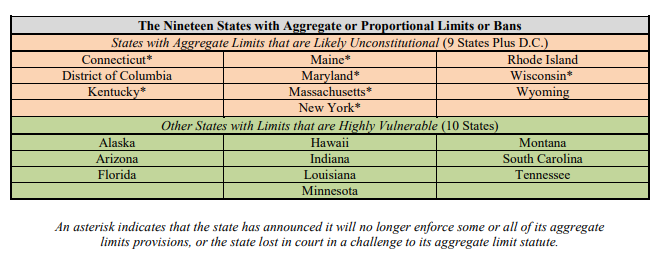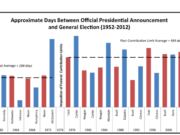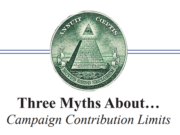Unenforceable: States Respond to McCutcheon and Support the First Amendment
By Matt Nese
On April 2, 2014, the Supreme Court issued its decision in McCutcheon v. Federal Election Commission, which invalidated the federal aggregate limit on contributions by individuals to candidate campaigns and political committees as unconstitutional under the First Amendment.[1] This brief examines the 19 states with aggregate limit or aggregate-like limit statutes and discusses state actions to comply with the Court’s ruling in McCutcheon.
Nine states – Connecticut, Kentucky, Maine, Maryland, Massachusetts, New York, Rhode Island, Wisconsin, and Wyoming – and the District of Columbia impose aggregate limits in some form on the overall amount entities may contribute to candidates and groups. These limits appear to be unconstitutional, according to the precedent set in McCutcheon. Another ten states – Alaska, Arizona, Florida, Hawaii, Indiana, Louisiana, Minnesota, Montana, South Carolina, and Tennessee – impose other forms of limits that operate in a similar fashion to an aggregate limit, leaving them highly vulnerable to a legal challenge, according to the reasoning in the McCutcheon decision.
Because of the Supreme Court’s ruling in McCutcheon, the aggregate limit statutes in the nine states and D.C. most similar to the federal limit struck down by the Court appear to be unconstitutional. Consequently, as of July 8, 2014, seven states – Connecticut, Kentucky, Maine, Maryland, Massachusetts, New York, and Wisconsin – have already announced that they will no longer enforce their aggregate limits. Additionally, the Rhode Island State Board of Elections announced that it would support legislation that would repeal the state’s aggregate limit provision, and the Wyoming Legislature is in the process of drafting a bill to repeal its aggregate limit statute for introduction in the 2015 legislative session. The state of Minnesota has also been enjoined by a federal court from enforcing a portion of its aggregate limit statute, as it undergoes a legal challenge.
|
The Nineteen States with Aggregate or Proportional Limits or Bans |
||
|
States with Aggregate Limits that are Likely Unconstitutional (9 States Plus D.C.) |
||
|
Connecticut* |
Maine* |
Rhode Island |
|
District of Columbia |
Maryland* |
Wisconsin* |
|
Kentucky* |
Massachusetts* |
Wyoming |
|
New York* |
||
|
Other States with Limits that are Highly Vulnerable (10 States) |
||
|
Alaska |
Hawaii |
Montana |
|
Arizona |
Indiana |
South Carolina |
|
Florida |
Louisiana |
Tennessee |
|
|
Minnesota |
|
An asterisk indicates that the state has announced it will no longer enforce some or all of its aggregate limits provisions, or the state lost in court in a challenge to its aggregate limit statute.
In accordance with the precedent set in McCutcheon and following in the footsteps of the seven states discussed above, policymakers in the District of Columbia and the remaining 12 states with aggregate limits or similar statutes should strongly consider repealing these speech-stifling regulations in order to enhance the First Amendment freedoms of the citizens residing in each of these states.
State Responses to McCutcheon
As a result of the Court’s ruling in McCutcheon, all nine states with aggregate limit statutes (and D.C) have already recognized McCutcheon’s applicability to their own law to varying degrees. Seven of these states (Connecticut, Kentucky, Maine, Maryland, Massachusetts, New York, and Wisconsin) have officially announced that they will no longer enforce their aggregate limit statutes on individual giving.
On the day of the McCutcheon ruling, the Massachusetts Office of Campaign and Political Finance announced that it “will no longer enforce the $12,500 aggregate limit on the amount that an individual may contribute to all candidates.”[2] Shortly thereafter, the Maryland State Board of Elections announced that “based on the pronouncement in the McCutcheon decision, the aggregate contribution limit…is unconstitutional and may not be enforced.”[3] Connecticut’s State Elections Enforcement Commission issued an Advisory Opinion on May 14 noting that it would cease enforcement of its aggregate limit statute.[4] On May 15, the Attorney General for the District of Columbia testified before the City Council, recommending that the District’s aggregate limit provision “is likely unconstitutional and should be considered for repeal.”[5] At a May 22 meeting of the New York State Board of Elections, the Board voted unanimously that the state’s aggregate statue was unenforceable and agreed to cease its enforcement.[6] The Maine Commission on Governmental Ethics and Election Practices announced in a policy statement after their May 28 meeting that it will cease enforcing the state’s aggregate limit for the duration of the 2014 election cycle, and likely permanently thereafter.[7] On June 5, the Kentucky Registry of Election Finance issued an Advisory Opinion indicating that its aggregate limit on individual giving to all PACs would not apply to the requestor.[8] That same day, the Wyoming Joint Corporations, Elections and Political Subdivisions Interim Committee voted to have its staff draft a bill for introduction in the 2015 legislative session that would repeal the state’s aggregate limit provisions.[9] Similarly, the Rhode Island State Board of Elections voted in April to back legislation that would repeal the state’s aggregate limit provision.[10] Additionally, Wisconsin had its aggregate limit struck down in Court,[11] and a district judge temporarily blocked the State of Minnesota from enforcing the state’s “first come, first served” limit, which caps the number of contributions candidates may receive from certain classes of donors.[12]
Officials in Alaska, Arizona, Florida, Hawaii, Indiana, Louisiana, Montana, South Carolina, and Tennessee have not indicated one way or the other how they intend to approach their aggregate and/or proportional limit statutes in the wake of the McCutcheon decision.
https://www.ifs.org/wp-content/uploads/2014/07/2014-07-08_One-Pager_McCutcheon_Unenforceable-States-Respond-to-McCutcheon.pdf
[1] 572 U.S. __, No. 12-536 (April 2, 2014).
[2] “OCPF’s statement on today’s Supreme Court decision, McCutcheon vs. FEC,” Massachusetts Office of Campaign and Political Finance. Retrieved on July 8, 2014. Available at: http://www.ocpf.net/releases/statement.pdf (April 2, 2014).
[3] Bobbie S. Mack et al., “Contribution Limits,” Maryland State Board of Elections. Retrieved on July 8, 2014. Available at: http://elections.maryland.gov/campaign_finance/documents/aggregate_limits_04112014_final.pdf (April 11, 2014).
[4] Anthony J. Castagno, “ADVISORY OPINION 2014-03: Application and Enforcement of Connecticut’s Aggregate Contribution Limits from Individuals to Candidates and Committees after McCutcheon,” State of Connecticut State Elections Enforcement Commission. Retrieved on July 8, 2014. Available at: http://www.ct.gov/seec/lib/seec/laws_and_regulations/ao_2014-03.pdf (May 14, 2014).
[5] Attorney General Irvin B. Nathan, “Letter to David Keating Re: McCutcheon v. FEC and its effect on District law,” Office of the Attorney General of the District of Columbia (May 21, 2014).
[6] Michael Gormley, “State: No limit on individual political donations,” Newsday. Retrieved on July 8, 2014. Available at: http://www.newsday.com/long-island/politics/state-no-limit-on-individual-political-donations-1.8186788 (May 26, 2014).
[7] “Policy Statement of the Maine Ethics Commission on Enforceability of Aggregate Contribution Limits,” State of Maine Commission on Governmental Ethics and Election Practices. Retrieved on July 8, 2014. Available at: http://www.maine.gov/ethics/pdf/ProposedStatementNottoEnforceAggLimit.pdf (2014).
[8] Emily Dennis, “ADVISORY OPINION 2014-003,” Kentucky Registry of Election Finance. Retrieved on July 8, 2014. Available at: http://kref.ky.gov/Contributions/2014_003_Opinion.pdf (June 5, 2014).
[9] Laura Hancock, “Wyoming lawmakers want to repeal caps to PAC spending,” Casper Star-Tribune. Retrieved on July 8, 2014. Available at: http://trib.com/news/state-and-regional/govt-and-politics/wyoming-lawmakers-want-to-repeal-caps-to-pac-spending/article_9a4c8196-d5ff-5eb3-a99b-a53214e8e8d7.html (June 6, 2014).
[10] Michael P. McKinney, “R.I. Board of Elections backs repeal of ‘total’ campaign contribution limit,” Rhode Island Providence Journal. Retrieved on July 8, 2014. Available at: http://www.providencejournal.com/breaking-news/content/20140417-r.i.-board-of-elections-backs-repeal-of-total-campaign-contribution-limit.ece (April 17, 2014).
[11] Scott Bauer, “Deal reached to kill campaign funding limits,” The Associated Press. Retrieved on July 8, 2014. Available at: http://www.washingtontimes.com/news/2014/may/8/deal-reached-to-kill-wisconsin-campaign-limits/ (May 8, 2014).
[12] Devin Henry, “Judge halts Minnesota campaign finance law,” MinnPost. Retrieved on July 8, 2014. Available at: http://www.minnpost.com/effective-democracy/2014/05/judge-halts-minnesota-campaign-finance-law (May 19, 2014).














